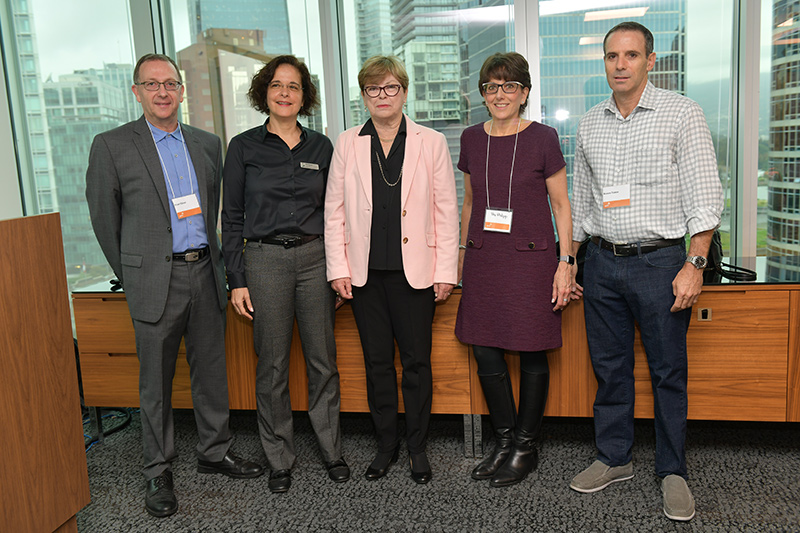Maxine Fassberg has navigated all levels of the high-tech sector and come out the other side as a leader, mentor and influencer. On Sept. 23, she shared her experience and insights about Israeli innovation at an event organized by the Western Region of Canadian Friends of Hebrew University (CFHU) and the Vancouver Israeli Tech Society. The talk took place at PwC in downtown Vancouver.

Ms. Fassberg, who was born in South Africa and grew up there until moving to Israel, is Executive in Residence at Intel Corporation in charge of the Mobileye acquisition at Intel. Ms. Fassberg holds a graduate degree in Chemistry from Hebrew University.
In her talk, she presented five main ingredients behind Israel’s innovation specific to the country which have not been duplicated anywhere else, even in Silicon Valley. The first is a combination of “out-of-the-box” thinking and a “can-do” attitude.
The second, unique to Israel, is the production of independent-thinking, confident risk-takers greatly influenced by their mandatory service in the Israeli Defense Forces (IDF).
Immigration is another important factor. Ms. Fassberg acknowledged that other countries, including Canada, benefit from the adaptability and flexibility present in most immigrants. However, the disproportionately high number of immigrants Israel has absorbed since its inception – specifically, the wave of Russian immigration in the 1990s – sets it apart from other modern countries.
The fourth component, according to Ms. Fassberg, is a gift from the Europeans who came to Israel in its early years with a high level of education, followed by subsequent waves of well-educated immigrants. These scientists, mathematicians, doctors and other professionals helped shape the excellent education system in Israel. In addition, the high-tech industry has pushed the Israeli government to maintain a high level of mathematics education to continue to feed the thriving tech industry.
The final ingredient is also related to the government which recognized that reducing bureaucracy and instituting creative taxation structures could spur on the creation of start-ups and attract multinational tech companies to Israel.
Israel’s tech sector is a huge success story because of these five factors, says Ms. Fassberg, and while she can share some of the wisdom she’s learned from 35 years at Intel, many of them in senior management, she sees the Israeli model as distinct.
She cautioned that with competition for qualified workers of all sorts in the high-tech sector, Israel could be pricing itself out of the market. Even with the advantages of a highly innovative and educated workforce, without sufficient supply of workers, multinational companies will be turned off by the high cost of Israeli employees.
One big advantage she sees with the way many multinationals operate in Israel is that they have both their R&D side and production in one country. Ms. Fassberg said this healthy interaction between the two activities enable companies to grow. Many places, like Silicon Valley, have R&D hubs but outsource their production to far-flung corners of the globe, whereas Israel maintains and expands the production side as the R&D continues. She also advises anyone looking to set up in Israel to look to the periphery – basically, anywhere other than Tel Aviv – due to high costs. She stressed there are growing tech hubs in Be’er Sheva and in the north that provide better economic opportunities.
Ms. Fassberg described her current role at Intel as the “best paid babysitter in the world.” She oversees the internal structure at Mobileye, the high-tech brainchild of Hebrew University professor Amnon Shashua. Mobileye developed the collision-prevention technology currently used by 70% of the automotive industry. In 2017, Intel purchased Mobileye for US$15.3 billion and Ms. Fassberg makes sure the merging of the companies is seamless and maximizes all the potential interfaces. Beyond Mobileye’s ability to generate profit for Intel through collision prevention technology, concrete plans for autonomous cars and all that goes with that concept are well underway at Mobileye.
“Mobility will be a service,” Ms. Fassberg said, and she understands what it takes to co-ordinate the many partners needed to create autonomous ride hailing. In turn, there are the material benefits to Intel from the high definition mapping information and other data generated by the many cameras on Mobileye-equipped cars.
It was a treat to hear Ms. Fassberg expound on her experience and the lessons she’s gleaned over the years.